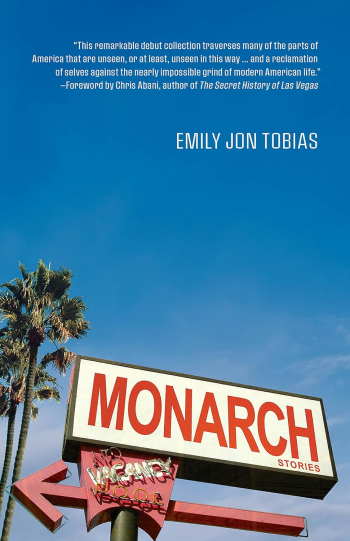.
.

The Dana Point, California writer Emily Jon Tobias, whose debut short story collection, MONARCH: Stories has been described by Kirkus as “a gutsy, grungy collection centering troubled souls,” and “more than a collection of stories, Tobias’ debut is a selection of gritty, emotional character studies…brimming with pure Americana.”
The introduction to her collection is excerpted below my remarks…
.
___
.
Dear Readers:
…..Full disclosure: Emily Jon Tobias is a dear friend of mine, so this post announcing her debut collection, MONARCH: Stories, is not a book review. I will leave critiques of her work to others, and for that purpose, blurbs from the likes of Kirkus, Pulitzer Prize winning author Junot Diaz, and other renowned writers and publishers are reprinted at the conclusion of this page.
…..Instead, this is simply an appreciation for her as a person, and as a creative artist.
…..I met Emily the way I meet many people these days – by way of my editing this website. In the fall of 2021 – before ever having met her – I received a short story from her titled “Mouth Organ,” which was entered into the 58th Jerry Jazz Musician Short Fiction Contest.
…..That was a challenging time for me. I was in the blinding darkness of a divorce after a 35-year marriage, and found myself in unfamiliar territory regarding my mental fitness – I was very often sad and hurt and would frequently question my desire (and ability) to continue to publish Jerry Jazz Musician. In retrospect, I was in the depths of depression.
…..In November, because I found “Mouth Organ” to be original and powerful, I made the decision to choose it as the contest’s winning story. When I informed Emily via email of my decision, like virtually everyone who has won a writing contest, she was gracious and filled with gratitude and joy for my seeing her gifts as a writer. The ensuing days-long email exchange signaled to me that I was communicating with an extraordinary person, one with an unusual appreciation for life and a warm, empathic spirit, and as our text and email correspondence became more frequent (she lives in California, I live in Oregon), we discovered a mutual safe space in which to share ourselves.
…..Emily told stories of her childhood growing up in what she calls an “ordinary” American midwestern town, and how she dreamed of leaving it to find herself via young adult wanderings that became so adventurous and comfortable she considered the road to be her home. Along the way, however, she made poor choices that ultimately resulted in the scourge of addiction – a dreaded place to inhabit, and to escape from. Eventually, her love of writing was a great force powerful enough to aid in redirecting her toward recovery (where she has remained), and ultimately earned her Master of Fine Arts in Writing from Pacific University in Oregon.
…..She shared her trials as a writer; how to find the energy for it, and how to get noticed, published, and distributed. Her challenges for finding a home for MONARCH is a story of determination in itself. This collection was originally slated for a 2023 publication via Nomadic Press, but when they closed their doors, MONARCH was left without a home. Yet, in the face of great disappointment, Emily picked herself up and pursued other avenues, resulting in a publishing agreement with Black Lawrence Press.
…..Meanwhile, Emily’s goodness was ever present for me. An example? For many months I was greeted with the warmth of her morning text message: “How is your heart today?” . Imagine awakening to such a text! She encouraged me to open myself to what I was feeling while not permitting me to go into blame or shame, and instead helped me focus on my character, and what I bring to my family, friends, and community. Through her acts of friendship and unusual kindness, as well as her wisdom and compassionate nature, I was reminded about the potency of meaningful connection, and began to emerge from the depths.
…..I reread “Mouth Organ” this morning and was reminded of the story’s core theme of an abused young man coming of age within a challenging family dynamic, and the difficult decisions one faces in overcoming a soul-wrenching co-dependency. It’s a compelling work of short fiction. Other stories in the collection tend to also feature gritty, abused, broken characters who feel a hunger for belonging, for finding a way out of the darkness of bad choices. In a way, before Emily’s friendship arrived, I could have been a character in one of her short stories, feeling lost and broken and looking for a path toward optimism, healing, and redemption.
…..As for Emily, I see the stories making up MONARCH. like individual puzzle pieces that, when put together, illustrate not just her personal resilience and strength – they also offer readers a primary example of how the healing power of art and creativity (and friendship) can make us whole again.
.
Joe Maita
Editor/Publisher
.

.
.
___
.
.

.
.
Excerpted from MONARCH: Stories, by Emily Jon Tobias (Black Lawrence Press). Used with permission of the author. All rights reserved.
.
.
INTRODUCTION
.
My mom raised me as a Midwesterner in an ordinary, middle-class American suburb where, as a kid, along with being a poet, the only dream I had was being on the road. I left home young, yearning for a sense of belonging. Live music became my road map through America, and I exchanged my family for friends on its streets. I became intoxicated by all our states, carved into the concrete of this country by how hard I danced here. I got high too many times. Open highways felt more like home than any one place I called my own. But a crack in me was forming, a deep chasm, knowing that one day, I’d have to come down.
…..Throughout my life, average abuses and abandonments happened, traumas no more or less severe than anyone else’s. Some were subtle, shifted in the wind like supple reeds. Others were deep, etched and scarring. While dark nights fell against the landscape of America, sunrises became harder to bear. Addictions took root like weeds. I became hard as cement, obsessions alive and vining, choked around my neck. Pain turned to rage as wounds festered. I became the abuser, prey turned predator. I hurt others. I left. Then later, the knife turned inward, hurt to be reborn as shame. Still fleeing at forty, I jumped my last train headed for a final wreck. I had betrayed myself over and over again. I was dying, no more than a shell, cracked.
…..On October 10, 2015 in a Seattle rehab, I was reminded of an old Leonard Cohen song, and I realized, finally, through my cracks, a little light had gotten in. On the road to recovery since, I have often idled at the stoplight long enough to glance in the rearview at the woman I was, now almost unrecognizable. Today, my spirit revs to go beyond the crossing, to go forward. In the light of reflection, I realize that I am not the woman I used to be.
…..I offer the stories in MONARCH to honor each human being’s capacity for change. Characters drive this collection, which amplifies the stories of unsung heroes who are shades of the sufferers and healers in all. Together, the stories in MONARCH explore the human condition through the lens of wounded warriors who learn to love by giving and receiving small acts of kindness. MONARCH‘s characters bear traumas with their bodies, and often, they transgress. America’s city scars, sewers, alleyways, and bars are landscape to their wars, as characters heal and transform under wind turbines and on open roads, in golden cornfields and with the wails of Chicago blues. They break in, break down, and ultimately, break open.
…..An inclusive invitation, MONARCH aims at an intimate portrayal of scarred characters on American streets beating the drum of current culture against the fierce rhythm of critical social justice issues. My hope is that readers are compelled to traverse these territories rather than flee. If willing to embark, I hope readers will feel safe to emote, to open their hearts to the ravaged, littered bits of us who despair and long for love. MONARCH‘s mirror reflects a changed view of America’s corners, where compassion shines even in the darkest hours, and I hope readers can find themselves there. So that when the trip is over, kindness compels us onward.
…..In the spirit of MONARCH’s transformation, may those who have felt abandoned be held; may those who have been ignored feel heard; may those who have remained unseen become emboldened. With this, I urge all to enter these pages with an open heart, where love ultimately reigns and light shines when it’s time to break.
.
.
Excerpted from MONARCH: Stories, by Emily Jon Tobias (Black Lawrence Press). Used with permission of the author. All rights reserved.
.
.
___
.
.
A sampling of praise for MONARCH: Stories
.
“Superb, original, and thoroughly alive with heartbreak and wonder. Tobias is electrifying.”
-Junot Diaz, Pulitzer Prize winning author of The Brief Wondrous Life of Oscar Woo
.
“A gutsy, grungy collection centering troubled souls. More than a collection of stories, Tobias’ debut is a selection of gritty, emotional character studies … Brimming with pure Americana, not unlike the movies Wild at Heart or Thelma and Louise, Tobias’ stories pull no punches. Readers are given descriptions of characters’ troubled mental states, which, like their bodies, ache and ooze … A strong collection.”
– Kirkus Reviews
.
“This remarkable debut collection that traverses many of the parts of America that are unseen, or at least, unseen in this way, and gives us a wealth of material to engage with and themes that make a collection worth biting into – loyalty, betrayal, happiness and deep sorrow, addiction and victory and a reclamation of selves against the nearly impossible grind of modern American life.”
Chris Abani, author of The Secret History of Las Vegas
.
“Close your eyes and imagine a story collection where every story is a diamond. MONARCH is just that. Each story took me and never let me go, even after the story had long ended. Written with such grace and elegance, this collection pulses with so much life, so much compassion, even when things seem to be bleak. After you finish this collection, after you read it for a second and third time, you’ll find yourself asking what I asked: ‘Where is Emily Jon Tobias’s next book?’”
-Morgan Talty, author of Night of the Living Rez and Fire Exit (forthcoming)
.
“A haunting, lyrical debut. These stories are unforgettable and wrenching, vital and wise. I’ll be returning to this book again and again. Tobias is an unmistakable talent.”
–Chelsea Bieker, author of Godshot, Heartbroke, and Madwoman (forthcoming)
.
“Full of empathy and rendered in searing, visceral prose, MONARCH shines brightly. In eleven vivid, affecting stories, Tobias turns her careful attention toward strugglers and strivers among us – the result is heartfelt and immersive.”
-Kimberly King-Parsons, author of Black Light and We Were the Universe
.
“The stories in MONARCH are raw and gritty and always real. Emily Jon Tobias gives voice to the outsiders, the misfits, and the broken. I can’t say enough great things about this debut collection.”
-Willy Vlautin, author of Lean on Pete and The Night Always Comes
.
“With prose at once sparse and weighty, Tobias effortlessly embodies the styles of Denis Johnson and Raymond Carver–while making them all her own. In this impressive debut collection, Tobias casts the spotlight on a wide array of characters/(unsung antiheroes) from varying walks of this often bleak thing called life. Showing us a vast scope of seemingly tranche de vie scenarios, ranging from ‘Nova’ to ‘Fish and Flowers,’ each tale of quiet woe in MONARCH offers its reader a kind of romantic fatalism, embedded among such philosophical themes as: the patriarch as fallen god (‘Jesus Wears Bermudas’), abusive relationships and repression (‘Red Cardboard Hearts Hanging From Strings’) and being an addict flitting among the invisible great unwashed (‘Under Her Cellophane Skin’). Wherever you fall on the spectrum of this existence, Tobias has surely covered it within these pages in delicate, thought-provoking detail.”
-Genna Rivieccio, Editor-in-Chief, The Opiate magazine
.
Additional blurbs are found here
.
.
___
.
.

Emily Jon Tobias is an American author and poet. She is an award-winning writer whose work has been nominated for the Pushcart Prize, along with other honorable mentions, and has been featured in literary journals such as Santa Clara Review, Talking River Review, Flying South Literary Journal, Furrow Literary Journal, The Opiate Magazine, The Ocotillo Review, Jerry Jazz Musician, Typehouse Literary Magazine, Tahoma Literary Review, Big Muddy, Spoon Knife, Peauxdunque Review, and elsewhere. Midwestern-raised, she now lives and writes on the coast of Southern California and holds a Master of Fine Arts in Writing from Pacific University Oregon. MONARCH: Stories (Black Lawrence Press, 2024) is her debut collection.
.
Click here to visit her website
Follow her on Instagram and Twitter: @emilyjontobias
Click here to read “Mouth Organ,” by Emily Jon Tobias, the winning story in the 58th Jerry Jazz Musician Short Fiction Contest
Click here to read “Why We Write” – a conversation with three Jerry Jazz Musician contributing writers (Emily Jon Tobias, Douglas Cole, and Antoinette Winstead
Click here to read “A personal loss, and a self-restoration,” by editor/publisher Joe Maita
.
.
___
.
.
Click here to read The Sunday Poem
Click here to read “A Collection of Jazz Poetry – Winter, 2024 Edition”
Click here to read “Ballad,” Lúcia Leão’s winning story in the 65th Jerry Jazz Musician Short Fiction Contest
Click here for information about how to submit your poetry or short fiction
Click here to subscribe to the (free) Jerry Jazz Musician quarterly newsletter
.
Click here to help support the ongoing publication of Jerry Jazz Musician, and to keep it commercial-free (thank you!)
.
.
___
.
.
Jerry Jazz Musician…human produced (and AI-free) since 1999
.
.
.





























